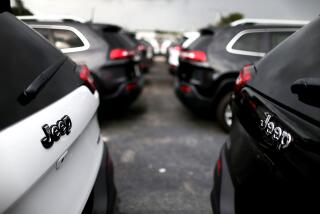Ford Aware of Venezuela Tire Defect in 1998
- Share via
CARACAS, Venezuela — Ford Motor Co. said Tuesday that its first report of problems with Firestone tires on Explorer sport-utility vehicles in Venezuela came in 1998--two years before it began replacing tires for customers there.
Ford officials in Venezuela said they began recalling tires in May only after waiting for Bridgestone/Firestone Inc. to act. The auto maker denied charges that it withheld information about defective tires that may have caused at least 10 deaths here, and also said the design of the Explorer did not contribute to tread separations and blowouts in Firestone tires.
Separately, the Florida attorney general’s office announced Tuesday that the two companies are targets of a civil racketeering investigation, and that it has issued subpoenas for an exhaustive review of corporate records.
The office is seeking records on everything from research and design of tires to reported defects, the number of factory workers assigned to each shift and training records. Spokesmen for Bridgestone/Firestone and Ford said they would cooperate.
In Washington, Ford Chief Executive Jac Nasser drew the ire of a powerful lawmaker by deciding to send subordinates to testify at next week’s hearings into tire failures on the auto makers popular SUVs.
A spokesman for Rep. W.J. “Billy” Tauzin, (R-La.), said the congressman is “somewhat miffed” that Nasser has declined to appear before his consumer protection panel next Wednesday. Spokesman Ken Johnson pointedly noted that Bridgestone/Firestone Chief Executive Masatoshi Ono will appear.
“A lot of people are going to find it curious that [Nasser] has time to cut TV commercials but won’t take the time to testify,” Johnson said.
Nasser has appeared in two advertisements, attempting to shore up consumers’ faith in the company.
Later this week, Venezuela’s consumer protection agency will issue a report holding both Ford and Bridgestone/Firestone responsible for the fatal accidents, a government official confirmed Tuesday.
Venezuela’s consumer protection agency, known as Indecu, on Thursday will submit a report to the attorney general accusing both companies of failing to act promptly after becoming aware of the faulty tires, said an Indecu spokesman who asked not to be named.
The Venezuelan agency’s report would add to the legal woes of both companies, which are also under investigation in the United States.
A rift between the two companies appeared to be widening as they attempted to defend themselves from intensifying attacks both abroad and in the United States.
Ford executives acknowledged that they became aware of accidents involving Wilderness tires in Venezuela as early as 1998, and asked Firestone for an explanation.
Ford director of purchases Hector Rodriguez said that Firestone submitted two reports blaming the accidents on excess tire pressure, badly repaired punctures and damage to the tires’ surface.
Unsatisfied with Firestone’s response, Ford began buying tires from Goodyear Tire & Rubber Co. in 1999. Rodriguez also said accidents involving Wilderness tires in Venezuela were becoming more frequent in 1999.
After a public outcry earlier this year, Ford in May began replacing Firestone tires with Goodyear tires on Explorers in Venezuela, Colombia and Ecuador. Rodriguez said Ford did not act sooner because the car maker was waiting for Firestone to provide its own solution.
Ford has replaced tires on 70% of some 39,000 Explorers in Venezuela since May, Ford spokesman Jason Vines said Tuesday.
The threat of prosecution in Venezuela has raised tensions between Ford and Firestone. Ford officials on Tuesday said they had unilaterally shouldered the responsibility for protecting consumers by changing the tires.
Bridgestone/Firestone and Ford disagree over just what the specifications for Venezuelan tires were. Ford said it asked for Firestone tires containing a layer known as a nylon cap in 1996. Nylon caps create a stronger bond between the tread and the steel belts in tires, which Ford considered necessary for Venezuela’s rougher roads.
But Bridgestone/Firestone said Ford did not request tires with a nylon cap until 1999.
Ford executives said they were surprised by news reports that Indecu would hold the auto maker responsible for the accidents because U.S. investigators have yet to determine the cause of Firestone tire failures. U.S. traffic safety officials are studying reports of tread separation and blowouts of Firestone tires, mostly on Ford vehicles, that are being blamed for 54 deaths and more than 100 injuries in the United States.






